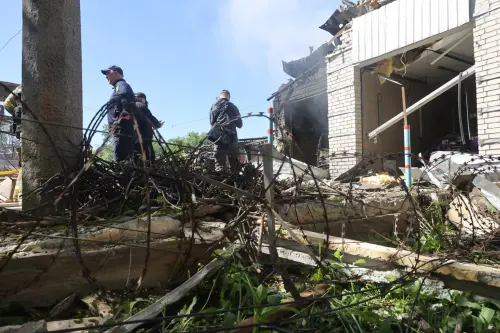Editor’s Note: The United States should retaliate against the Syrian regime, for several reasons including re-establishing deterrence, writes Michael O’Hanlon. However, he concludes cruise missiles are not likely to change the overall course of the war. While additional moves will not be risk- or cost-free, they will be less daunting than witnessed in Iraq and Afghanistan.
Although I believe that President Barack Obama has taken too long to offer meaningful help to the Syrian opposition over the past two years, a policy that has permitted President Bashar Assad to remain in power too long while it facilitated the rise of extremist insurgent groups, I also sympathize with the White House’s apparent reluctance to engage in that country’s terrible civil war, even at this juncture.
On balance, the United States should retaliate against the Syrian regime. Presidential credibility is on the line, given that last year Obama called the possible use of chemical weapons a “red line” — meaning that if Assad crossed the line, his action would require a fundamentally different kind of American response.
More important than Obama’s personal credibility is the need to re-establish deterrence, so that the Syrian regime does not conclude that it has a green light to use chemical weapons even more widely. Beyond Syria itself, there is the matter of Iran, where the U.S. president has also established a red line: The Iranian regime will not be allowed to develop a nuclear weapon.
While Iran’s nuclear program is hardly within the bounds we would like, even Iran’s previous leader, President Mahmoud Ahmadenejad, did not cross that red line — perhaps out of conviction that doing so would prompt American military action. If deterrence is working even partially in Iran, we cannot afford to squander it by allowing Obama’s words on other issues to be proved hollow.
That said, Obama’s hesitancy is understandable. There is always a temptation in this kind of situation to “do something.” Cruise-missile strikes, with weapons fired from ships in the Mediterranean, perhaps, seem a popular option at present, just as cruise missiles were often the go-to policy option in the 1990s in Iraq and Afghanistan and Sudan. But with 100,000 already dead from conventional weapons in this war, responding to chemical weapons use that may account for 1 percent of all casualties to date would obviously achieve only limited effects in a broader sense. And finding the Syrian army units responsible for this action, or locating chemical weapons depots that might be struck by cruise missiles or other ordnance, too, are tasks that present major targeting challenges. Whatever our success might be in any such limited retaliation, moreover, the effects will probably be localized and tactical. The war will rage on.
What we really need is an integrated strategy for ending the war that envisions a future political settlement among the belligerents. Such a strategy will require time. It will not work immediately and may ultimately involve the deployment of 10,000 or more U.S. troops to help implement any peace deal that may be reached in the future, once battlefield dynamics have evolved to the point where such a deal is feasible. Absent such a strategy, limited military action today might help re-establish U.S. credibility and deterrence, but will likely not meaningfully affect the trajectory of the conflict.
The international community needs to clarify that, while our strong preference is still that Assad must go, this is not a war against his fellow Alawites. Any future political framework for Syria must protect all groups, including minorities. Indeed, autonomous zones for different groups may be required, in certain parts of the country, in a confederal arrangement.
Given the amount of blood that has been spilled, and the amount of mistrust that has been sowed, any such deal will probably not be self-enforcing — hence the likely need for a Bosnia-style peace implementation force including many NATO, Arab League, and other Islamic countries. And such a mission would surely be more dangerous for peacekeeping troops than was Bosnia, given the widespread presence of extremists.
That sounds like a heavy political lift. The alternative, however, is for Syria to become the new Somalia, right in the heart of the Levant and broader Middle East, offering sanctuaries to terrorists and wreaking instability from Lebanon to Israel to Jordan and beyond.
With such a broader strategic framework in place, and publicly articulated by Washington and other key capitals, every tactical move can be placed in proper perspective and context. Arming the rebels and perhaps even helping them with sustained air power down the road becomes a much more palatable proposition, because the effort will be limited, in pursuit of a very specific purpose.
But laying out the complete strategy in such terms also helps explain why Obama, who wisely looks down the road beyond his next move in this war, is wary of involvement. Again, I believe he has little choice and that he should act more assertively to develop, define, and gain international consensus for such a strategy — and also to gain support for it here at home.
But that will not be easy. And many of the recommendations now being voiced in the American policy debate skirt this fundamental question of how Obama’s next tactical move fits into a larger strategy. We need more than an immediate response to the latest tragedy in Syria. We need a long-term strategy. And while it will not be risk- or cost-free, it will be a far less daunting effort than either Iraq or Afghanistan, even if it will be substantially harder than launching a few cruise missiles.



Commentary
Op-edLong-Term Strategy Needed to End the War in Syria
August 26, 2013